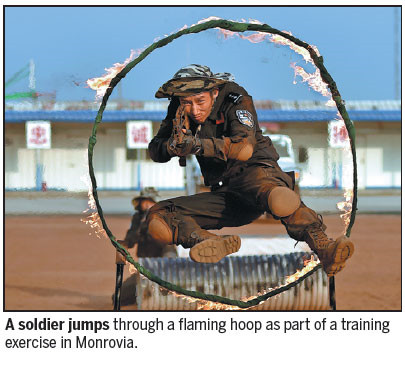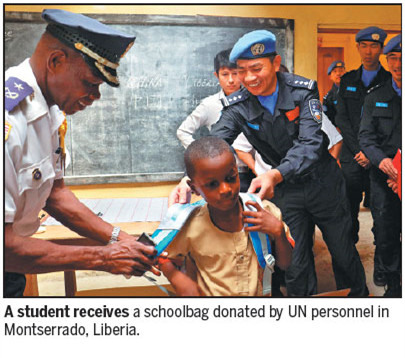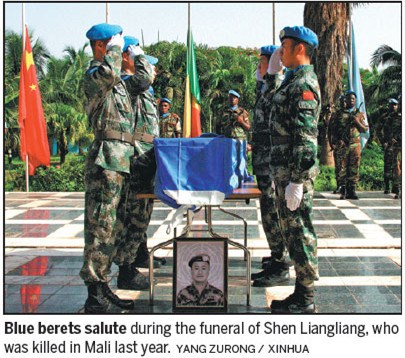Trump card
On Dec 5, 2013, the first batch of 135 Chinese peacekeepers arrived in Gao, which had been liberated from occupying insurgents less than a year before.
The Chinese force was put to the test almost immediately. On Dec 24, two rockets were fired at their compound; one landed in a river, the other exploded 1 kilometer away.
During their nine-month mission, the Chinese peacekeepers conducted more than 450 patrols and 290 escort missions, and were subjected to more than 30 rocket attacks and suicide bombers, but there was not a single causality, Zhang said.
On Aug 1, 2014, at a medal ceremony for UN peacekeepers, the then-MINUSMA force commander, Major General Jean Bosco Kazura, thanked the Chinese peacekeepers for their crucial contribution.
"The Chinese peacekeepers are MINUSMA's trump cards," he said.
'Iron Roses' solving thorny problems
The evolution of peacekeeping missions has seen female soldiers becoming increasingly involved in front-line action.
In 1993, female soldiers accounted for just 1 percent of uniformed personnel deployed from around the world. This year, out of approximately 96,800 uniformed peacekeepers, women constitute 3.7 percent of military personnel and 9 percent of police personnel in UN peacekeeping missions, according to UN data.
China's peacekeepers are continuing that trend and some female soldiers - nicknamed the "Iron Roses" - are at the forefront.
Liu Jia, a policewoman from the fourth batch of peacekeeping police sent to Liberia in West Africa last year, was one of six females, and the only female police officer, in the 140-strong force deployed for the UN peacekeeping mission in Monrovia, the capital.
Like her male colleagues, Liu took part in patrol and sentry duties, all in full body equipment under the baking sun. Despite the heat, she seldom drank water in the field because she did not want to inconvenience the team by wasting time finding a restroom.
"My time in Liberia has turned me from a 'princess' into a 'tough girl'," she said, laughing.
In addition to her usual duties, she also acted as the team's counselor. "The situation in Liberia is very tough, and people are often stressed out or homesick, but men tend not to admit it to their male colleagues," she said. "However, having a trusted female listener can really bring peace of mind."
On one occasion, she comforted one of her peers when his father-in-law died. "Whatever was troubling the men, whether it was family or the mission, I was always willing to listen and help," she said.





















































